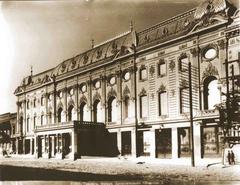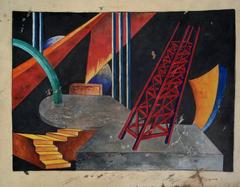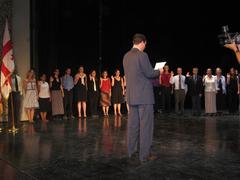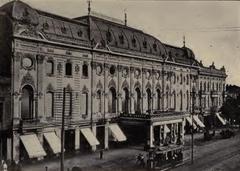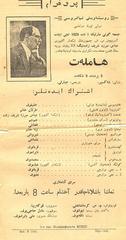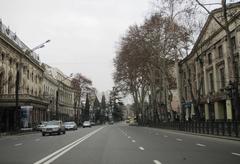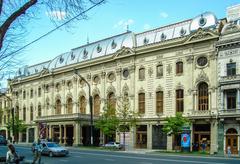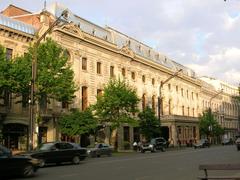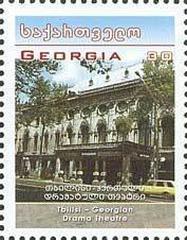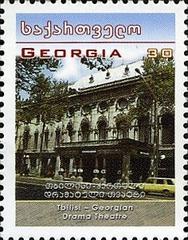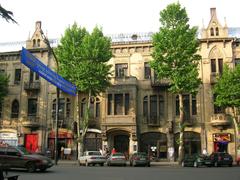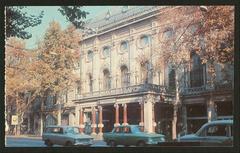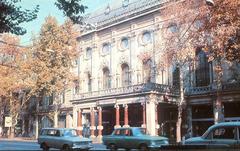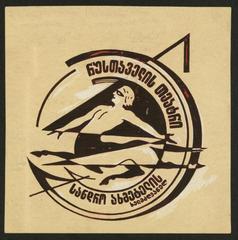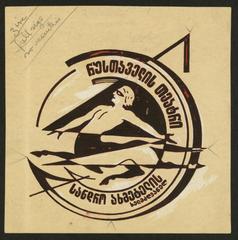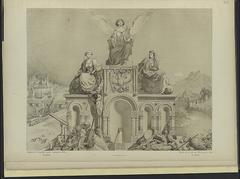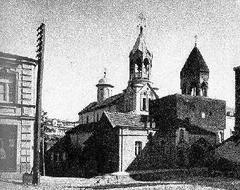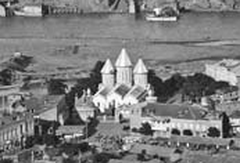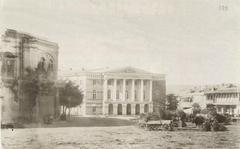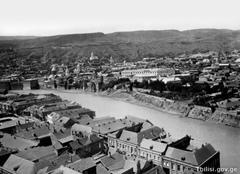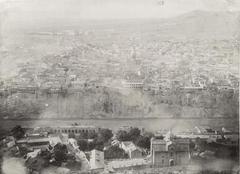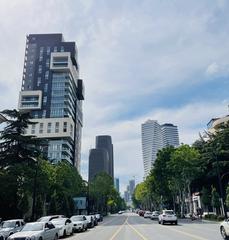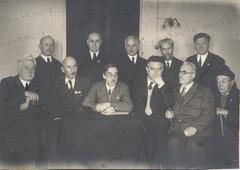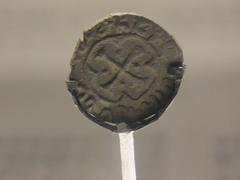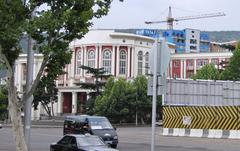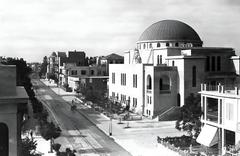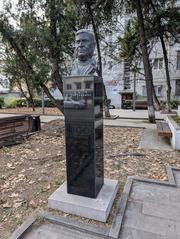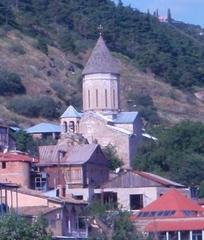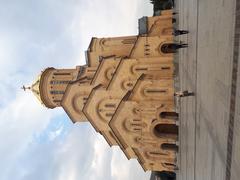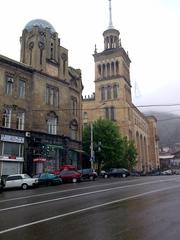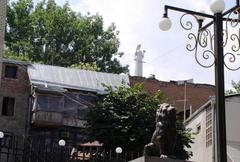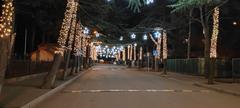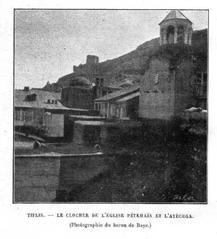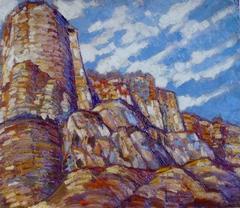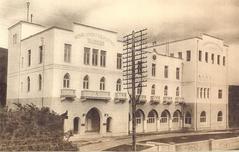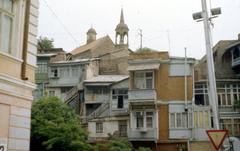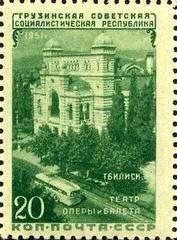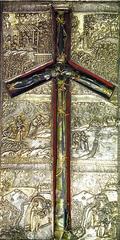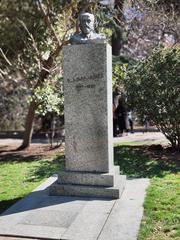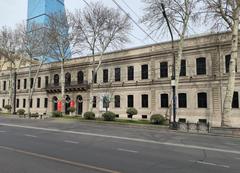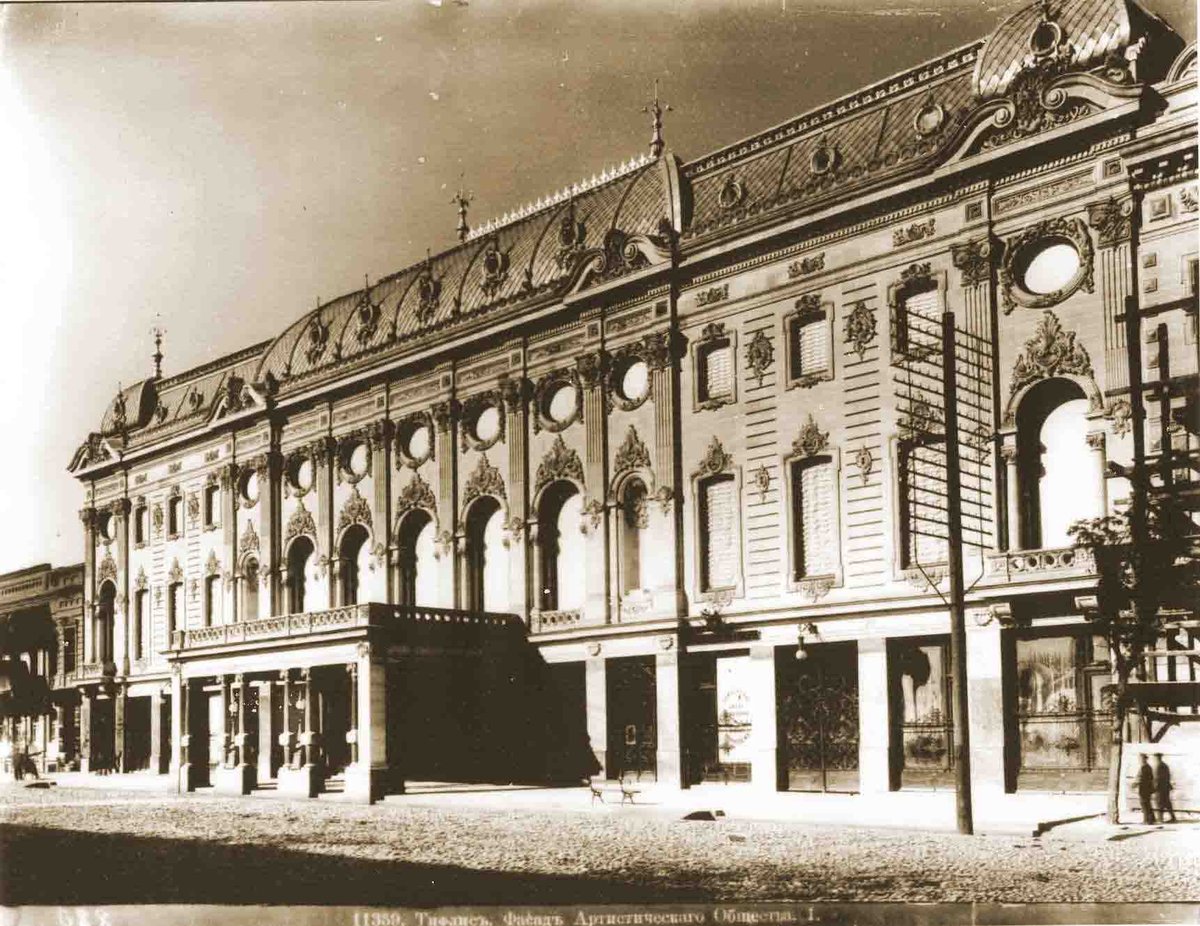
Rustaveli Theatre Visiting Hours, Tickets, and Guide to Tbilisi Historical Sites
Date: 14/06/2025
Introduction: The Rustaveli Theatre’s Legacy in Tbilisi
The Shota Rustaveli State Drama Theatre—widely known as the Rustaveli Theatre—is one of Tbilisi’s most iconic cultural landmarks. Situated on the bustling Rustaveli Avenue, the theatre is celebrated for its architectural splendor, rich artistic heritage, and enduring role in Georgian cultural life. Since the late 19th century, it has been a beacon for preserving Georgian language, drama, and national identity, making it a must-visit for anyone interested in Tbilisi’s historical sites and vibrant performing arts scene (georgia.travel; Tbilisi Local Guide).
The theatre’s blend of Baroque, Rococo, and Art Nouveau architecture, crafted by Alexander Shimkevich and Korneli Tatishchev with European artisans, creates a stunning visual experience. Its legendary revolving stage and ornate interiors speak to the theatre’s technological and artistic sophistication (georgiastartshere.ge; georgia.to). Over the decades, Rustaveli Theatre has hosted groundbreaking performances by renowned directors and has stood as a pillar of Georgia’s resilience through political change.
This guide provides a comprehensive overview of the theatre’s history, architecture, visiting hours, ticketing, accessibility, and its place in the broader tapestry of Tbilisi’s cultural attractions. Whether you are a theatre aficionado or a traveler seeking meaningful experiences, Rustaveli Theatre offers a unique window into Georgia’s artistic heart (advantour.com).
Table of Contents
- Discover the Rustaveli Theatre in Tbilisi: A Landmark of Georgian Culture
- Architecture & Design
- Visitor Essentials
- Rustaveli Theatre: Cultural Significance and Civic Role
- 2024–2025 Performance Schedule, Tickets, and Planning Your Visit
- Summary of Key Information
- References and Further Reading
Discover the Rustaveli Theatre in Tbilisi: A Landmark of Georgian Culture
Origins and Early Development
The Rustaveli Theatre was born in the era of Georgian national revival in the late 19th century, during a time of cultural suppression under the Russian Empire. Georgian intellectuals, including Ilia Chavchavadze and Akaki Tsereteli, sparked the movement to create a permanent Georgian dramatic stage, leading to the founding of the Drama Committee and the launch of the Georgian Drama Theater in 1879 (georgia.travel). The theatre’s current home was established after acquiring land on Rustaveli Avenue in 1898, with the foundation stone laid that November (Tbilisi Biennale PDF, p. 3).
Architectural Significance
Completed in 1901, the theatre’s design melds Baroque, Rococo, and Art Nouveau influences. The architects, Shimkevich and Tatishchev, worked with Italian and Greek artisans to create a structure adorned with lavish stucco, gilded accents, and imported crystal chandeliers (Tbilisi Biennale PDF, p. 3). Technologically advanced, the theatre boasted one of the Russian Empire’s earliest revolving stages and sophisticated ventilation, optimizing both audience comfort and performance possibilities (Tbilisi Biennale PDF, p. 4).
Naming and Early Years
Initially opened as the Artistic Society Theatre, the venue quickly became a multicultural hub, hosting Georgian, Russian, and Armenian productions. The first Georgian-language performance, Akvsenti Tsagareli’s “Khanuma,” premiered in March 1901 (Tbilisi Biennale PDF, p. 4). In 1921, the theatre was renamed to honor Shota Rustaveli, Georgia’s revered 12th-century poet (rustavelitheatre.ge).
Cultural Impact and Artistic Legacy
The Rustaveli Theatre has long been a crucible for Georgian dramatic arts, launching the careers of influential directors such as Kote Marjanishvili, Sandro Akhmeteli, and Robert Sturua. Its repertoire spans Georgian and European classics and avant-garde works (georgia.to). Iconic productions like Brecht’s “The Caucasian Chalk Circle” exemplify the theatre’s innovative spirit (ivertubani.com). The Kimerioni café in the theatre’s basement was a gathering place for early 20th-century artists, with murals by Lado Gudiashvili and others still partially preserved (obrienvandersteen.com).
Evolution Through Political Change
Through Soviet censorship and post-independence renaissance, the Rustaveli Theatre has remained a bastion of Georgian identity and creative expression (ivertubani.com; georgia.to), continually adapting its artistic vision while retaining its historical roots.
Visiting: Practical Information
- Visiting Hours: Tuesday–Sunday, typically 10:00 AM–6:00 PM (box office); evening performances start around 7:00 PM. Always verify on the official website before planning your visit.
- Tickets: Purchase at the box office, online, or through authorized vendors. Prices generally range from 10–60 GEL.
- Accessibility: The theatre is wheelchair accessible and offers assistance for visitors with disabilities.
- Getting There: Centrally located on Rustaveli Avenue, accessible by metro (Rustaveli station), buses, taxis, and ride-sharing.
- Nearby Attractions: Within walking distance are the Georgian National Museum, Tbilisi Opera and Ballet Theatre, Freedom Square, and other cultural sites.
Visual and Interactive Experience
Explore the theatre’s museum, virtual tours, and galleries online. Photographs of the façade and interiors—with alt tags like “Rustaveli Theatre Tbilisi exterior” and “Opulent interior with chandeliers”—offer a preview of what to expect.
Frequently Asked Questions
Q: What are the Rustaveli Theatre’s visiting hours?
A: Generally Tuesday–Sunday, 10:00 AM–6:00 PM. Performances begin at 7:00 PM. Check the official website for updates.
Q: How do I buy tickets?
A: Purchase online, at the box office, or via authorized vendors.
Q: Is the theatre accessible?
A: Yes, with ramps and accommodations for mobility needs. Contact in advance for specific requirements.
Q: Are guided tours available?
A: Yes, by request. Tours include backstage and historical highlights.
Q: What’s in the repertoire?
A: A mix of Georgian classics, European works, and contemporary productions.
Architecture & Design
Exterior and Façade
The theatre’s façade is a striking mix of Baroque and Rococo, conceived by Tatishchev and Szymkiewicz (georgiastartshere.ge). Grand arches, ornamented dormers, and a stately portico with columns define its street presence. Despite fire damage in 1949, the façade was expertly restored, preserving its original elegance (georgiastartshere.ge; lasmaplone.com).
Interior Spaces and Artistic Features
Inside, visitors encounter a lavish foyer, sweeping staircases, and a richly decorated auditorium—a showcase of Rococo style with gilded accents and ceiling frescoes (georgia.to). The basement’s historic frescoes by artists like Lado Gudiashvili, David Kakabadze, and Serge Sudeikin are legendary, though many were whitewashed during the Soviet era (en.wikipedia.org). The auditorium’s design ensures excellent acoustics and sightlines, with crystal chandeliers and velvet drapes enhancing the ambiance (georgiaintrend.com).
Facilities and Accessibility
The multi-level structure includes an 800-seat main hall, rehearsal rooms, offices, and artists’ quarters (georgia.to). Major renovations (2002–2005) modernized backstage and technical systems, while improving accessibility with ramps and elevators (georgia.to).
Restoration and Preservation
Ornate woodwork, wrought iron, and original decorative elements have been meticulously restored (georgiastartshere.ge). Ongoing efforts seek to recover original artworks, particularly basement frescoes (en.wikipedia.org).
Integration with Rustaveli Avenue
The theatre anchors Rustaveli Avenue, Tbilisi’s principal boulevard, surrounded by other landmarks. Its plaza and portico are lively public spaces, reinforcing the theatre’s role as a hub of city life (lasmaplone.com; thetouristchecklist.com).
Notable Events and Ongoing Conservation
After the 1949 fire, rapid restoration underscored the theatre’s cultural value (georgiastartshere.ge). Modern safety and climate control systems ensure its preservation (georgia.to).
Visitor Essentials
Visiting Hours, Tickets, and Tours
- Hours: Tuesday–Sunday, 10:00 AM–6:00 PM (check for seasonal variations).
- Tickets: 10–50 GEL for performances; 15–20 GEL for guided tours (georgia.to).
- Accessibility: Ramps, elevators, and accessible seating.
- Guided Tours: Backstage and art-focused tours available by appointment.
Nearby Attractions & Events
Explore the Georgian National Museum, Tbilisi Opera and Ballet Theatre, and Parliament Building, all within a short walk. The theatre hosts festivals, premieres, and special exhibitions—check the event calendar for details.
Photographic Highlights
Capture the grand façade, illuminated portico, and opulent interiors. Photography is generally permitted in public areas, but restricted during performances.
Visual and Interactive Features
Official sites offer virtual tours, interactive maps, and photo galleries for planning your visit and enhancing accessibility.
Frequently Asked Questions
Q: What are the visiting hours?
A: Most days 10:00 AM–6:00 PM, Tuesday–Sunday.
Q: How much are tickets?
A: Tours: 15–20 GEL; performances: 10–50 GEL.
Q: Is the theatre accessible?
A: Yes—ramps, elevators, and seating are available.
Q: Are tours available?
A: Yes, guided tours can be booked in advance.
Q: Which attractions are nearby?
A: National Museum, Opera House, Parliament, Rustaveli Avenue.
Rustaveli Theatre: Cultural Significance and Civic Role
National Identity and Artistic Innovation
As a central institution since 1879, Rustaveli Theatre has cultivated Georgia’s artistic aspirations and civic consciousness (Tbilisi Local Guide; Advantour). Its productions have often reflected the nation’s historical struggles and cultural pride.
Endurance and Symbolism
The theatre has served as a forum for national expression and peaceful resistance—from 19th-century demonstrations to Soviet-era censorship (Tbilisi Local Guide). Artistic innovation thrived even in adversity, with international acclaim for directors like Robert Sturua.
Social Dialogue and Engagement
Rustaveli Theatre continues to address social themes, fostering dialogue and civic engagement through its repertoire and public presence (Tbilisi Local Guide).
2024–2025 Performance Schedule, Tickets, and Planning Your Visit
Performance Highlights
The 2024–2025 season includes:
- Georgian Classics: Works by Shota Rustaveli and Lasha Bugadze
- World Drama: “Hamlet,” “The Caucasian Chalk Circle”
- Contemporary and Experimental: New plays and avant-garde productions
- Special Events: Festivals and guest performances
Full schedules and updates are available on the official Rustaveli Theatre website.
Ticketing and Discounts
- Prices: 20–60 GEL, with discounts for students, seniors, and groups.
- Booking: Recommended online in advance or at the box office.
Accessibility
- Language: Performances are in Georgian; English and Russian subtitles for major shows.
- Facilities: Accessible entrances, seating, and restrooms.
- Guided Tours: Available in multiple languages.
Dress Code and Visitor Tips
- Dress: Smart casual; formal for premieres.
- Arrive Early: Doors open 30 minutes before performances.
- Amenities: Café and bar on-site.
Summary of Key Information
Rustaveli Theatre is a living monument to Georgian artistry, resilience, and innovation. Visitors can enjoy its world-class repertoire, guided tours, and awe-inspiring architecture while benefiting from modern facilities and proximity to Tbilisi’s top cultural attractions (georgiastartshere.ge; Tbilisi Biennale PDF; rustavelitheatre.ge; georgia.to). Plan your visit by checking the official website for updated hours and ticketing, and consider using the Audiala app for exclusive content and seamless planning (official Rustaveli Theatre website; Audiala app).
References and Further Reading
- Rustaveli Theatre Tbilisi: Visiting Hours, Tickets, and Historical Insights, 2024
- Rustaveli Theatre in Tbilisi: Architectural Marvel, Visiting Hours, Tickets, and Travel Guide, 2024
- Rustaveli Theatre Tbilisi: Visiting Hours, Tickets, and Cultural History, 2024
- Rustaveli Theatre Visiting Hours, Tickets & 2024-2025 Performance Schedule in Tbilisi, 2024
- Rustaveli Theatre official website, 2024
- Advantour: Rustaveli Theatre Tbilisi, 2024
- Tbilisi Biennale PDF: Rustaveli Theatre, 2024
- Georgia.to: Georgian Theatre and Rustaveli Theatre, 2024
